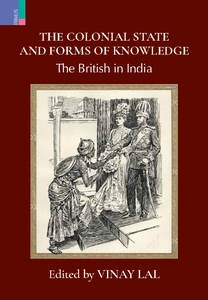The Colonial State and Forms of Knowledge: The British in India
Colonialism is generally understood to encompass political domination, military expansion, and economic exploitation, but the British, in their nearly two centuries of rule over India, also achieved a thoroughgoing conquest of knowledge. In the backdrop of the Enlightenment impulse, which held that everything can be known, mapped, counted, categorized, and bounded, and the knowledge thus acquired reshaped into useable forms, the British in India created an epistemological state. The Colonial State and Forms of Knowledge: The British in India examines the fields and bodies of knowledge through which this state was created.
The colonial state not only produced historical, linguistic, religious, and purportedly scientific accounts of ‘the people of India’, but also founded organizations such as the Linguistic Survey of India and the Anthropological Survey of India, besides deploying such forms of institutionalizing knowledge as the ‘report of the committee of inquiry’ in their quest to know and govern India. The discursive formation that the British put into place as they brought India under their control, and instances of their more precise interventions in history, geography, cartography, anthropology, lexicography, and veterinary science, among other areas of knowledge, are delineated in this volume.


